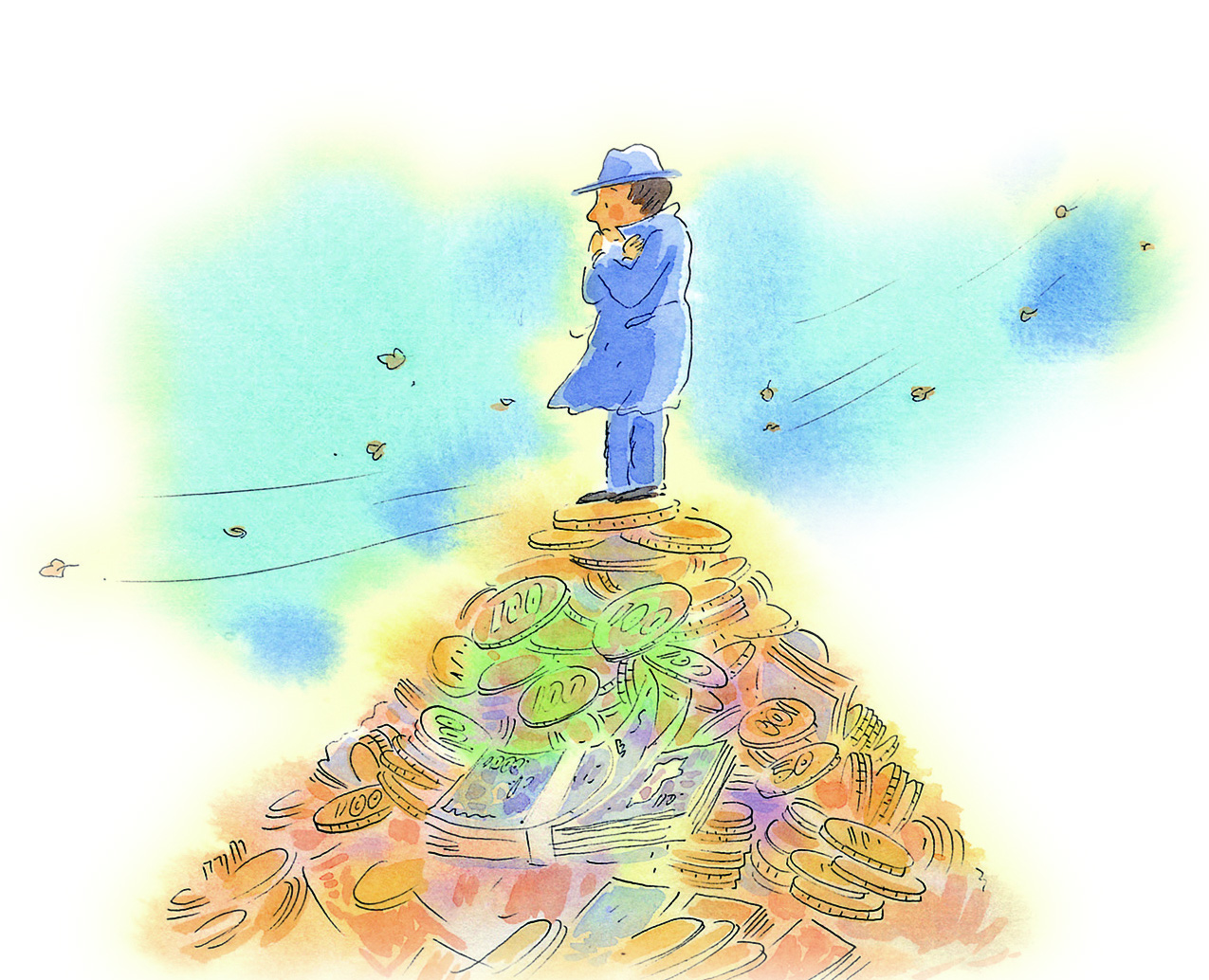Special Topics
Commonly Asked Questions about the Buddhist Perspective on Wealth
As most people are inclined to crave wealth, the Buddha once likened money to a poisonous snake. However, by maintaining the right view on wealth management, Buddhists can also deal with it righteously and use it to find stability of livelihood as well as transform it into a tool for practicing generosity and performing good deeds.Q1: Should Buddhist actively manage their money or not?
 A: Most people associate money management with making investments. According to the Sigālovāda Sutta, the Buddha once advised his lay disciples to allocate their income for living expenses, capital for running business, savings, and giving. Therefore, in a broad sense, the Buddhist way of money management involves proper allocation of income, including increasing sources of income as well as reducing expenses.
A: Most people associate money management with making investments. According to the Sigālovāda Sutta, the Buddha once advised his lay disciples to allocate their income for living expenses, capital for running business, savings, and giving. Therefore, in a broad sense, the Buddhist way of money management involves proper allocation of income, including increasing sources of income as well as reducing expenses.Money is merely one of many means to meet our daily needs. We did not bring it along at birth and nor can we take it with us at death. While investing time to make money, we should also know how to use it wisely to improve our quality of life. It is a pity that some mistakenly equate the accumulation of wealth with happiness, viewing the pursuit of money as the ultimate value of life. By spending most of our time chasing after profits, as well as fixating on how much money we have, we will leave our emotions fluctuating with figures and subject to sorrow, lamentation, pain, and distress. This leads us to neglect family life, becoming disconnected with family members, and makes us ill through overwork. In this way, rather than making money, we are actually compromising our time, family relationships, and physical health. What is even worse is that desiring to make huge profits and to amass wealth by resorting to inappropriate means is tantamount to allowing money to steal our character, which is truly unnecessary.
In fact, only spiritual growth and the good karma we have created are the invisible fortunes that stay with us. When it comes to money, Buddhists should weigh their "needs" against "wants," instead of treating money as the sole purpose of life. As for how much energy should be put into accumulating wealth, we should, given our limited lifespan, manage our time properly in a balanced manner, just as we should allocate our income wisely, for our family, work, and spiritual cultivation.
Q2: Can Buddhists invest in real estate, stocks, and funds?
A: The Buddha taught laity to divide their wealth into four parts, allocating one part for making a living. Therefore, it is not against the Buddhist teachings to earn money with legal investments. However, as various investment tools and the myth of "a little investment for a lot of return" prevail nowadays, Buddhists must establish a correct concept of money to avoid being trapped in the mire of greed.
First of all, it's crucial to distinguish "speculation" from "investment." There is no such thing as a free lunch; higher returns always come with higher risks. Investment involves choosing a right way to make profits, instead of trying to get rich overnight. On the contrary, speculation is investing in high-risk markets, hoping to make big returns with small capital, which is actually no different from gambling. While some investment tools are harmless in and of themselves, utilizing them inappropriately will lead to results detrimental to both self and others.
For Buddhists, peace of body and mind is much more important than money. Risk tolerance and spending priorities may vary among people, whether investing in real estate, stocks, or funds. However, the principle of maintaining a peaceful body and mind should always come first. Keeping this in mind, we'll be less likely to be lured into engaging in investments beyond our risk tolerance, allowing our emotions to be affected by the figures in the financial statements. In addition, when selecting investment targets, we should avoid enterprises whose scope of service violates the Five Precepts, in order to prevent contributing to evil karma.
Q3: When doing business, are Buddhists supposed to limit their profit margin?
A: An enduring business that benefits both parties of buyer and seller should operate on the basis of openness, honesty, mutual trust, and mutual benevolence. If only one party profits, or if deceit is involved, such cooperation cannot be sustained.
Take the relation between upstream and downstream vendors, for instance. Exploiting vendors and employees for more profit margins is unjustifiable. The profits gained from monopolizing certain resources through personal connections to drive up prices should also be considered unjustifiable. Conversely, a food manufacturer that is based on honesty and integrity may use genuine ingredients, thereby increasing the cost of their products. Because the consumers appreciate their principle, they are willing to pay higher prices. In this case, it is certainly fair for the manufacturer to increase the selling prices.
Q4: Buddhism emphasizes contentment with little desire, but how can the economy thrive without consumer spending?
 A: People have different "wants" and "needs." For example, if someone requires an expensive smart phone for work, then it is considered a necessity. But when people buy smart phones simply for fun or due to peer pressure, or even replace their phones frequently just to keep up with trends, it is certainly a want, rather than a need. The Buddhist perspective on consumption is definitely not about passively avoiding spending money; rather, it is about refraining from resorting to overproduction to spur demand and consumption, thereby causing waste. It is hoped that the market can return to the normal mechanism of supply and demand. Hence, contentment with little desire will not compromise the overall economic growth and technological advancement, such as the research and development in medicine, communication, and the environmental industries. As long as these technologies are needed for our daily life, their development will continue.
A: People have different "wants" and "needs." For example, if someone requires an expensive smart phone for work, then it is considered a necessity. But when people buy smart phones simply for fun or due to peer pressure, or even replace their phones frequently just to keep up with trends, it is certainly a want, rather than a need. The Buddhist perspective on consumption is definitely not about passively avoiding spending money; rather, it is about refraining from resorting to overproduction to spur demand and consumption, thereby causing waste. It is hoped that the market can return to the normal mechanism of supply and demand. Hence, contentment with little desire will not compromise the overall economic growth and technological advancement, such as the research and development in medicine, communication, and the environmental industries. As long as these technologies are needed for our daily life, their development will continue.Q5: Does donating more money necessarily result in more merit?
A: When people say "good deeds result in good," they tend to take giving as a form of investment, like living a frugal lifestyle and saving up spare money in their "merit" account, thereby maintaining the principal while earning interest.
In fact, the initial aspiration of giving determines the level of merit. We can also gain merit by rejoicing at others' giving. However, performing the act of giving while harboring the intention to acquire greater karmic rewards, despite the blessings due to be gained in the future, will also increase our greed.
The most well-known example is the story of Emperor Wu of the Chinese Liang dynasty and Bodhidharma. Emperor Wu of Liang made significant contributions to making offerings to monastics, practiced giving, and built many pagodas and temples. When he asked Bodhidharma, "What kind of merit do I gain from building temples and making offerings to monastics?" Bodhidharma replied, “No merit.”
His reply carries twofold meanings: people performing the act of giving with the intention to gain merit have little merit; on the other hand, practicing the virtue of giving without thinking of receiving anything return brings about great merit. Thus, there is no direct correlation between the amount of money given and the merit obtained.
Q6: Does Buddhism encourage people in debt to practice monetary giving?
A: The act of giving is definitely not exclusive to the wealthy. Giving of worldly possessions such as money, a form of external wealth, is just one way to practice giving. Other forms of giving include the giving of internal wealth (such as blood donation), the giving of Dharma (dharmadāna), and the act of dispelling others' fear (abhayadāna). Even simple acts, like a warm smile or a sympathetic word, can also be considered giving. People selflessly volunteering to serve the general public by dedicating their time, energy, and professional expertise are also practicing giving. So, anyone can practice giving, regardless of their wealth. People in debt can also resort to suitable ways of giving according to their capabilities without having to deliberately borrow money.
Q7: Can we expect more fortune coming our way after giving money?
A: In the Buddha's time, an arhat in his alms round saw a poor person about to commit suicide. The arhat asked the poor person, "Would you like to sell your poverty?" The poor wondered and asked, "Can poverty be sold?" The arhat replied, "Certainly. All you need to do is go and bring me a scoop of water." The moral of this story is that poverty is the result of being stingy in one's past lives, which, with various conditions working together, manifests as a temporary phenomenon in one's present life. Even though fetching water for the arhat does not constitute a form of monetary giving, the poor person already planted the cause of making offerings. As the condition ripens, the blessings naturally follow, enabling him to be liberated from the sea of suffering.
However, the initial intention behind giving is essential. If done with the purpose of merely seeking after more wealth—for example, donating 100 dollars in the hope of receiving 1,000 in return as a form of investment—then the karmic reward generated is limited. On the contrary, if we practice giving with a joyful mind and strive to increase the sources of our income while reducing our spending for the sake of practicing giving, fortune will naturally come our way.
Related articles:
Buddhist Perspectives on Wealth
The Financial Quotient of Buddhism
How Can Gold Turn Out to Be a Poisonous Snake?
The Guardian Deities of Wealth Revered in Buddhism
Commonly Asked Questions about the Buddhist Perspective on Wealth
Resource: Issue 394 of Humanity Magazine, Dharma Drum Publishing Corporation
Translation: Sinag-ling Li (李祥苓)
Editing: Keith Brown, Chia-Cheng Chang (張家誠)
